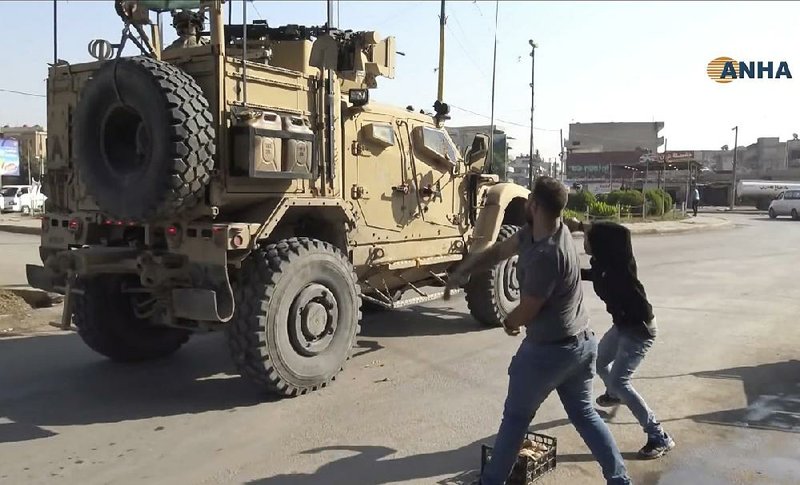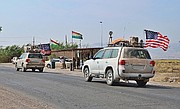QAMISHLI, Syria -- Heckled by Kurds who feel betrayed, a long convoy of U.S. troops crossed into Iraq early Monday, accelerating a withdrawal of American forces from northern Syria that set the stage for the Turkish invasion of Kurdish-controlled land.
Residents threw rocks and potatoes at the convoy as it drove through Qamishli, a major city in Kurdish-held territory. In video posted online by a local Kurdish news outlet, ANHA Hawar, men hurling potatoes at an armored vehicle shouted "No America" and "America liar" in English.
Another group tried to block the convoy's progress by standing in its path and holding placards of protest.
"The Americans are running away like rats," one man could be heard shouting.
President Donald Trump's withdrawal of American troops from the region, which cleared the way for Turkey to attack Kurdish forces, has prompted Republicans and Democrats alike to accuse him of abandoning a U.S. ally. A coalition of Syrian Kurdish fighters, Americans and other foreign troops had fought the Islamic State in northeastern Syria since 2014.
Defense Secretary Mark Esper confirmed Monday that the United States was considering keeping a small force in northeastern Syria, alongside the Kurdish-led Syrian Democratic Forces, to prevent oil fields there from falling into the hands of the Islamic State.
About 1,000 American troops were in Syria before the withdrawal began this month. The New York Times reported that Trump was leaning toward leaving about 200 troops there.
[Video not showing up above? Click here to watch » https://www.youtube.com/watch?v=hAHRPXFyq14]
Esper said Sunday that most forces would be redeployed to western Iraq, where they would continue operations against the Islamic State.
But he said in a tweet Monday that the U.S. would only "temporarily reposition" troops from Syria "in the region" until they could return home.
"I don't think it's necessary, other than we secure the oil," Trump said Monday of the U.S. military presence in Syria. "We need to secure the oil."
A "small number of troops" would also remain in southern Syria at the request of Israel and Jordan, he added in remarks to reporters at a meeting of his Cabinet in Washington.
Trump has repeatedly pledged to stop U.S. involvement in "endless wars" in the Middle East. At Monday's Cabinet meeting, Trump said "we never agreed to protect the Kurds ... for the rest of their lives."
"I got elected on bringing our soldiers back home," he said. Repetition of that pledge, he said, brought the "largest cheer" during a political rally in Dallas last week.
The U.S. withdrawal has reduced American clout in Syria, ceding more control and influence to the Syrian government, Russia and Iran. It has also raised fears of a revival of the Islamic State, the extremist group that once controlled an area in Iraq and Syria the size of Britain.
In an earlier phase of the withdrawal, coalition forces bombed their own base and arms cache in northern Syria to prevent enemies from using it.
Some Syrian Kurds see the withdrawal as a betrayal, since it has enabled Turkish-led forces to invade the area and potentially force Kurds from their ancestral homes.
"There will be ethnic cleansing of the Kurdish people from Syria, and the American administration will be responsible for it," Mazlum Kobani, whose Kurdish-led force fought the Islamic State in Syria, said Sunday in an interview.
On Monday, a leader of Syrian Kurdish forces said Trump's withdrawal of U.S. troops was "akin to genocide."
Ilham Ahmed told reporters that her message to Trump is "Stop these massacres."
Ahmed was in Washington for meetings Monday. Among those she saw were senators who have sponsored a bipartisan measure sanctioning Turkey until it halts its invasion of northern Syria.
Two of those sponsors are South Carolina Republican Lindsey Graham and Maryland Democrat Chris Van Hollen.
They say the U.S. should keep a modest number of American troops in Syria and provide air protection for the Kurds.
Turkish officials say their campaign is targeting only Kobani's militia, not Syrian Kurds at large. Over 200 Syrian civilians have died since the invasion began, while at least 20 have died in Kurdish counterattacks in southern Turkey. More than 170,000 people have been displaced, according to estimates by the International Committee of the Red Cross.
A cease-fire agreement reached by the United States and the government of Turkish President Recep Tayyip Erdogan on Thursday committed Turkey to a five-day pause in the offensive to allow the Syrian Kurdish fighters to withdraw from a 20-mile-deep zone inside Syria along the Turkish border.
Turkey and the Kurdish-led Syrian Democratic Forces have accused each other of violating the cease-fire's terms, while U.S. officials have said the truce is generally holding.
Until this month, northeastern Syria had largely been under the control of the Syrian Democratic Forces, which had used the chaos of the eight-year civil war to establish an autonomous region that operated independently of both the central government in Damascus and Syrian Arab rebel fighters.
The U.S.-led campaign against the Islamic State allowed the Kurdish force to expand its territory and take over the governance of land seized from the extremists.
But the creation of an American-backed and Kurdish-held canton along the Turkish-Syrian border became a source of great anxiety for the Turkish government, which considers the Kurdish militia a threat to national security. The militia is led by an offshoot of a Kurdish guerrilla movement that has waged a decades-long insurgency against the Turkish state.
Information for this article was contributed by Ben Hubbard and Patrick Kingsley of The New York Times; by Kareem Fahim, Karen DeYoung, Susannah George, Dan Lamothe and Missy Ryan of The Washington Post; and by Lolita C. Baldor and Zeke Miller of The Associated Press.
A Section on 10/22/2019


